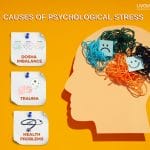
Workaholism or work addiction is a mental health condition in which a person is addicted to work. Like any other addiction, a person suffering from workaholism also gets a ‘high’ by excessive working and continues to repeat this pattern. They might be aware of all the negative impacts work addiction might be causing in their lives, but they simply can’t stop because they are addicted to it. It is often characterised by the need to achieve a job status or career success, but it is different from ambition. In workaholism, a person doesn’t care about emotional distress or personal issues. Their addiction to work surpasses any emotional crisis.
Symptoms of Workaholism
- Working for prolonged hours, even when it is not required
- Obsession with the success at work
- Intense fear of failure at a project at work
- Working excessively to avoid relationships
- Avoiding sleep for work projects
- Working to cope up with guilt and depression
- Working excessively to avoid dealing with any emotional crisis
Psychological Disorders Found in Workaholics
Workaholics are at a higher risk of psychological disorders. These disorders may be the causes of work addiction, or they might be the consequences arising as a result of work addiction. The four main psychological disorders tied up with workaholism are ADHD, OCD, anxiety and depression. As compared to non-workaholics, workaholics score a higher percentage of having these psychological disorders.
ADHD (Attention-Deficit Hyperactivity Disorder)

ADHD is usually characterised by inattentiveness, lack of focus, impulsiveness and/or excessive physical activity. People with ADHD have trouble focussing on the task at hand, as compared to their colleagues. Hence, they might have to spend a longer duration of time trying to finish up the same project. Also, many people suffering from ADHD work better in environments with less noise and distractions. So, they might prefer to work after everyone has left, leading to excessive hours of work. This creates a cycle of procrastination and work addiction.
The impulsive nature of ADHD people makes them take extra work than they are able to handle, again leading to a cycle of work addiction. In order to control or pacify their hyperactive nature, they need to be constantly active. Work stress and excessive work act as a stimulant in this context, leading to workaholism.
Rather than acting as a cause, ADHD may also be developed as a result of workaholism.
OCD (Obsessive Compulsive Disorder)

OCD is a physiatric disease that is generally characterised by excessive and intrusive thoughts leading to repetitive behaviour. Workaholics have been found to have obsessive-compulsive traits, such as obsessing over tiny details of perfection, need to control things, etc.
Workaholism is a kind of obsessive behaviour and it is possible that this addiction is the reason behind the development of OCD in workaholics. It is also possible that work addiction is used as a coping mechanism to OCD induced behaviour and workaholism is a direct consequence of OCD.
Anxiety and Depression

Anxiety and depression are commonly found psychiatric disorders in workaholics. People suffering from anxiety and depression may get addicted to working excessively as it alleviates their negative feelings and also helps them enhance their self-esteem. It acts as an escape mechanism in this scenario.
In another possible context, anxiety and depression may develop as a result of excessive working and fear of failure at work. Either ways, anxiety and depression are closely related psychological disorders in workaholics.
Takeaway
Work addiction or workaholism may result in many psychological disorders or may arise due to such disorders. In either case, the ties between workaholism and psychological disorders are closely related. There is a possibility of treatment of workaholism by identifying the disorder related to it and getting it treated. In most cases, work addiction acts as an escape or coping mechanism to the symptoms arising due to these disorders.


























5 Comments